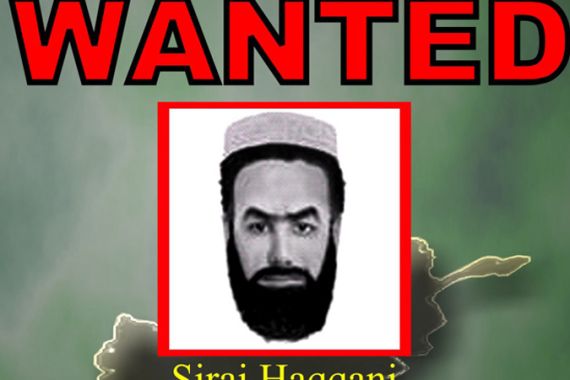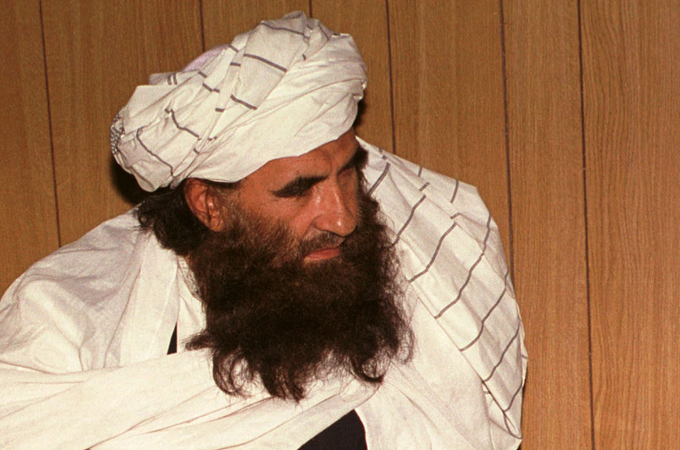Haqqanis linked ‘to Pakistan government’
US envoys remarks come as the network says it would take part in peace talks along with the Taliban.

 |
| The Haqqani network has been blamed for a series of attacks, including last week’s assault on sites in Kabul [REUTERS] |
The Haqqani network, reportedly one of the most feared armed groups operating in Afghanistan, has links with the Pakistani government, said the US ambassador to Islamabad on Saturday.
Several of the recent attacks across Afghanistan have been blamed on the Haqqani network, which is believed to be based in the tribal areas across the border in Pakistan.
“The attack that took place in Kabul a few days ago, that was the work of the Haqqani Network,” Ambassador Cameron Munter told Radio Pakistan. “And the facts, that we have said in the past, [is] that there are problems, there is evidence linking the Haqqani network to the Pakistan government. This is something that must stop.”
The remarks are sure to further strain tensions between Washington and Islamabad, as officials hold together a fragile “anti-terror alliance”.
Earlier on Saturday, Haqqani leader Sirajuddin Haqqani said the network would take part in peace talks with the Kabul government and the US – but only if the Taliban did.
The Haqqani had previously rejected several peace gestures from the US and the government of Afghan president Hamid Karzai, because they were an attempt to “create divisions” between armed opposition groups, he told the Reuters news agency.
Haqqani said any further attempts to do so would also fail.
 |
| Jalaluddin, Sirajuddin’s father, was an anti-Soviet fighter before joining the Taliban [Getty Images] |
Richard Barrett, the coordinator of the UN al-Qaeda and Taliban monitoring team, told Al Jazeera that the United States should have been pressing Pakistani officials to get the Haqqani to enter peace negotiations.
“If that has happened, that would be significant,” he said. “It would show that Pakistan is doing something to bring some peace.”
“Most likely, there is a fear among the Haqqani people that, if there are talks, they don’t want to be left out,” he added.
US officials, including Leon Panetta, secretary of defence, suspect the Haqqani network to be behind the recent 20-hour assault on diplomatic quarters in Kabul that began on September 13.
Bismillah Khan Mohammedi, Afghanistan’s minister of interior, also said that evidence obtained from the scene of the battle pointed to groups such as Haqqani.
He warned that Afghans would experience many more such attacks if “terrorist hideouts outside Afghanistan are not destroyed”.
But when asked if the Haqqani network was responsible for the Kabul assault, Sirajuddin said: “For some reasons, I would not like to claim that fighters of our group had carried out the recent attack on US embassy
and NATO headquarters.
“Our central leadership, particularly senior members of the shura [a consultative council], suggested I should keep quiet in future if the US and its allies suffer.”
Important positions
| Retired Lt Gen Masood speaks to Al Jazeera’s Teymoor Nabili about the significance of the Haqqani statement |
The US has repeatedly pressed Pakistan to go after the Haqqani network it believes is based in the North Waziristan tribal region near the Afghan border.
“They offered us very very important positions but we rejected and told them they would not succeed in their nefarious designs. They wanted to divide us,” Sirajuddin said.
Referring to the Afghan Taliban leadership, he said: “We would support whatever solution our shura members suggest for the future of Afghanistan.”
But Sirajuddin said his group no longer has sanctuaries in Pakistan and feels secure inside Afghanistan.
“Gone are the days when we were hiding in the mountains along the Pakistan-Afghanistan border. Now we consider ourselves more secure in Afghanistan. Besides, the Afghan people, senior military and police officials are with us,” he said.
Talat Masood, a former lieutenant general in Pakistan’s army, told Al Jazeera that any willingness of Haqqani to enter peace talks would be “an extremely significant development”.
“[This is] because the Haqqani group is one of the most lethal, most dangerous groups – and the Americans consider him to be practically the number one enemy. They even give him greater importance, in terms of his lethality, [than] the Taliban,” he said.
“I think this announcement, also that he is no longer in Pakistan, is to placate Pakistan and to reduce pressure on Pakistan … Pakistan is suffering enormously as a result of Haqqani’s presence – relations between Pakistan and the US are at one of [their] lowest, and one of the reasons is their presence.”
Sirajuddin’s father, Jalaluddin, was a renowned commander during the war against the occupying forces of the former Soviet Union.
In the 1990s, he joined the Taliban government and was one of its senior members towards the end of their rule.
After the toppling of the Taliban administration, the senior Haqqani is believed to have established a base in the Waziristan region, from where his forces have fought NATO troops in northeastern Afghanistan, most notably in Kunar and Nangrahar provinces.
The senior Haqqani has since retired due to health reasons and his son, Sirajuddin, is believed to be leading operations of the network.
The US has posted a bounty of up to $5m for Sirajuddin.